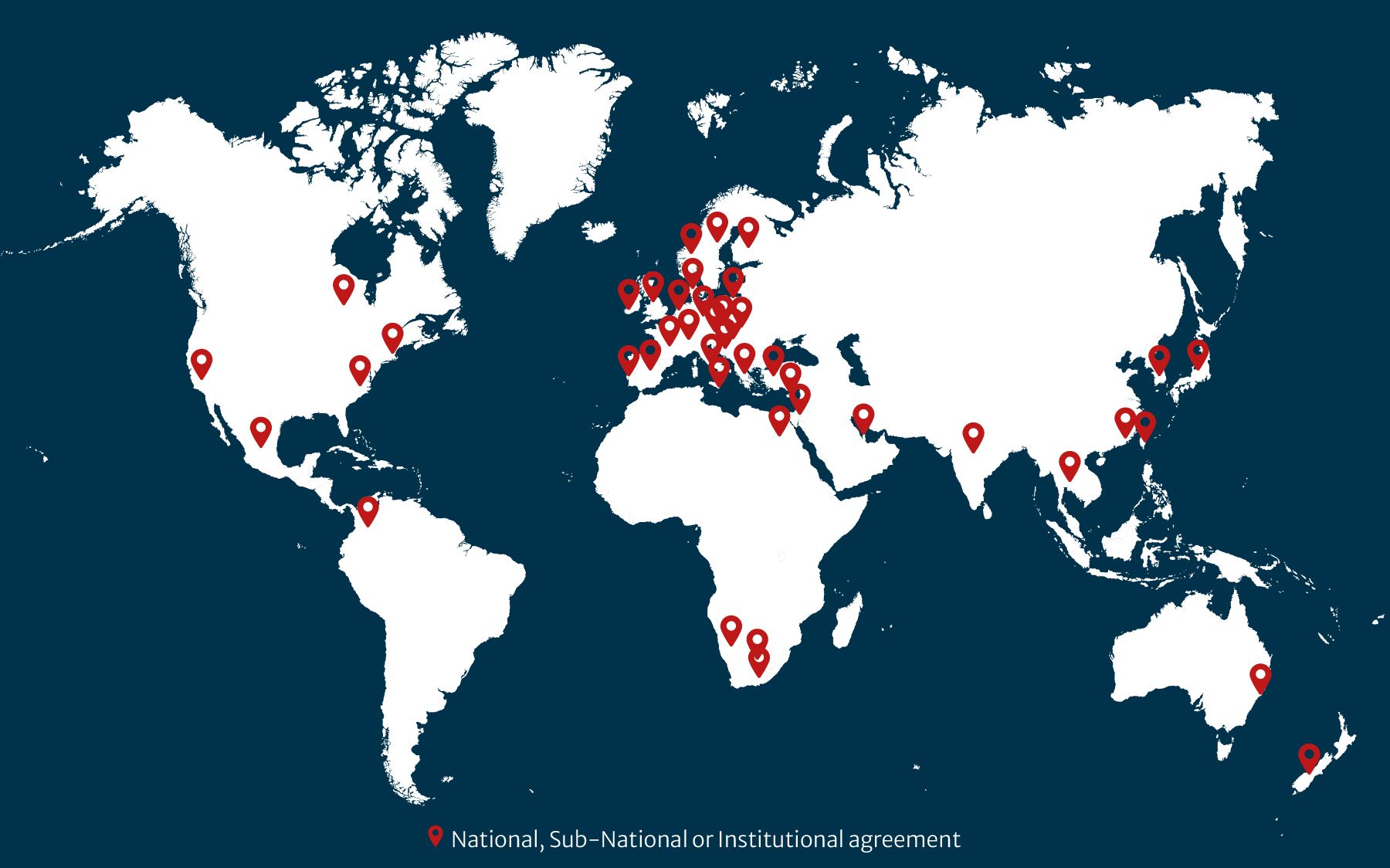Spotlight on Transformative Agreements
Springer Nature's transformative agreements (TAs) powered 7x more gold open access (OA) articles than via author choice in 2023


TAs powered 7x more gold OA articles in Springer hybrid titles than via author choice in 20235
5 7x more gold OA articles in Springer hybrid titles than authors choosing to publish OA in 2023 while not being part of a TA

46%6 year on year increase in OA articles published due to Springer Nature’s TAs
6 Based on CAGR

180k OA articles published via TAs since 2015, 44.5k articles published in 2023

OA uptake continues to see the highest increase from HSS researchers, 36% uptake shown in 2023
The number of TAs agreed by Springer Nature with partners has increased by 57% since 20227. At the end of 2023 they supported researchers across 3,500+ institutions and enabled over 44,000 OA articles to be published under 44 agreements.
7 57% increase from 2022, CAGR from 2015-2023 was 40%
- First with California8
- First in Latin America8
- Largest with DEAL8
- First in Africa (Egypt)8
- Largest in Japan8
8 At the time of signing

Springer Nature TAs have a significant impact on the transition to a global and equitable OA landscape
Our TAs powered 7x more gold OA articles than via author choice
In 2023, our TAs published 7x more gold OA articles in Springer hybrid titles than via author choice (authors choosing to publish OA9).
9 Authors choosing to publish OA in those titles that were included in the TA

Source: Springer Nature data
TAs having an immediate and sustained impact on a country’s OA output
In 2023 over half of the countries where Springer Nature has a TA in place saw a 70%+ uptake in OA publishing. Nearly all of these countries also saw an increase of more than 600% in the uptake of OA publishing in 2023 compared to the year before the TAs were implemented.
For countries where TAs went live in 2023, such as Slovakia, Slovenia, Portugal, Denmark and South Africa, the countries saw an OA uptake between 62% and 78%, which in all cases represented an increase in OA publications of more than 250%.10
10 Compared to the % of OA publications before the TA went live
OA proportions per agreement country pre-TA vs 2023
| Country | Proportions |
|---|---|
| Denmark |
63%
|
|
16%
|
|
| Portugal |
72%
|
|
6%
|
|
| Slovakia |
62%
|
|
9%
|
|
| Slovenia |
73%
|
|
19%
|
|
| South Africa |
78%
|
|
10%
|
Source: Springer Nature data
Established agreements such as in Australia, Egypt, and Ireland continue to see significant OA growth in their second and third years, with OA uptake increasing by double digits in 2023. OA uptake in the US increased to over 15% in 2023 (from just over 10% in 2022) due to agreements with CDL, MIT, SCELC, NREL, Carnegie Mellon and Northeastern.
OA proportions per agreement country pre-TA vs 2023
| Country | Proportions |
|---|---|
| Australia |
75%
|
|
8%
|
|
| Ireland |
61%
|
|
8%
|
|
| Egypt |
65%
|
|
1%
|
Source: Springer Nature data
TAs are driving equitable access globally
70% of TA content downloads11 in 2023 came from anonymised users – indicating that they may not have had a way to access the articles if behind a paywall12 – showing the impact TAs are having on increasing access for all.
Some of the highest average download rates per TA article compared to subscription articles came from Africa and Asia.
Researchers in these regions experienced a 10x and 11x higher average download rate per TA article compared to subscription articles, highlighting the importance of TAs in driving more equitable access to research.
11 All articles published via a TA between 2016-2023
12 Not affiliated to an Institutional address and so unlikely to be covered with access via a TA or subscription

↑ 10x
in Africa
↑ 11x
in Asia
Source: Springer Nature data
TAs are driving OA equity amongst disciplines. Global OA uptake continues to see yearly advantage for HSS researchers
On a discipline level, OA uptake continues to see the highest increase from HSS researchers. 2023 saw a 36% uptake in OA by HSS researchers.
On a country level, Australia, Ireland and Portugal saw the highest growth in OA publications in HSS compared to other disciplines from pre-TA to 2023, in all cases by at least 870%.13
13 from year prior to agreement compared to 2023
HSS OA uptake 2017–2023
| 2017 | 2018 | 2019 | 2020 | 2021 | 2022 | 2023 |
|---|---|---|---|---|---|---|
|
10% |
13% |
15% |
22% |
27% |
31% |
36% |
Source: Springer Nature data
However, there is still some way to go to ensure that researchers from all countries can realise the benefits of publishing in this way. We are working with funders to encourage a wider roll-out, but we understand that budgets and policies can make the transition complicated.
When countries and institutions are ready to move to a TA, we are there to partner with them.
In the meantime, to ensure equity of publication and access, we are experimenting with different models, as well as being flexible in our approach to meet the different needs of researchers in different geographies and disciplines.
Meeting partner challenges: a case study
A new pilot with Japan offers membership options according to budget. This ensures universities can transition to OA at a speed suitable for them, with the opportunity to fully or partially transform to OA, and researchers can benefit from OA and amplification of their research.

Dr. Amane Koizumi
Project Professor, National Institutes of Natural Sciences, an organising member of Research University Consortium (RUC)
“It is of great significance that [...] national and private universities and Springer Nature have worked together to progress the opening of research and its outputs and information of Japan to the global community. We will continue to make efforts to facilitate more universities in joining this engagement.”
Open Access at Springer Nature


Ensuring equitable OA
We work to eliminate barriers to creating, discovering and using knowledge

Investing in technology to advance OA
We are committed to investing in technology to provide a streamlined, valuable experience, enabling researchers to advance discovery

Spotlight on integrity
To accelerate the next phase of the transition to OA, we’re investing strongly in technology and AI, with a particular focus on protecting the integrity and trust of research.